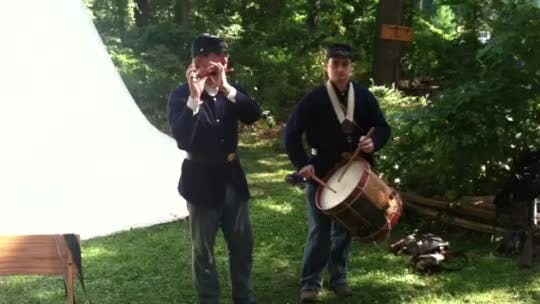Mel Scharffbillig of Hastings says he was born 100 years too late.
"I would've been free as a bird," he said of living in an older era. "Life was simpler — it made more sense. You didn't keep buying Styrofoam cups every day. You had a metal cup that lasted you all your life. Or in my case, I made a metal cup that lasted me a lifetime, as long as I didn't lose it."
Scharffbillig was playing the role of a Civil War-era blacksmith at Hastings' Civil War Weekend Sept. 7 and 8. His sentiments about an older era — when people seemed more connected to one another — and his appreciation of the challenges faced by Minnesotans in the Civil War era was shared by other re-enactors at the annual event, many seen carrying tin cups filled with lemonade in the 90-degree temperatures.
People were dressed in heavy 1800s garb, slept in tents, and carried out the daily tasks of civilians and soldiers. Children played games, and a mock Civil War wedding took place. Camps surrounded the William G. LeDuc Historic House, a mansion built during the Civil War.
The theme was "The Price of Victory," given that this year marks the 150th anniversary of the 1863 Battle of Gettysburg.
"To put it very bluntly, the price of victory was death," said Amy Deaver, volunteer coordinator for the event organized by the Dakota County Historical Society. "Gettysburg had the all-time highest death rate."
The event featured speakers on mourning; a Civil War-era coffin was on display.
"We really try to minimize the presence of 21st-century trappings," Deaver said. "It's very realistic."
A Hastings man who has been a blacksmith for more than 53 years played someone who made utensils, latches and other tools.
"I grew up without electricity, so I know what it was like," Richard Carlson said.
A volunteer at the event approached Carlson with a broken handle on her purse. Carlson dug into his pockets and started bending metal.
"He has all the tools," Dottie Bronowski said with a laugh. "He can fix anything."
Just eat it or go hungry
At the cooking camp, Spencer Johnson spent his weekend cooking food such as salted beef or pork, boiled sausages, sauerkraut, potatoes and hard crackers that soldiers often joked would break their teeth.
Johnson is a seventh-grade U.S. history teacher at Hastings Middle School, and students helped him.
"This kind of stuff just hooks the kids," Johnson said.
They made applesauce from apples on the land and eggs from the chicken coop a few feet away.
"It gives you an appreciation for what people went through back then. We're only here two days. I can go home and take a shower, sit in air conditioning. They had to be sweaty and dirty, and they couldn't even take a break," Johnson said.
A couple of camps away, a sergeant demonstrated to children how to fire a musket. The children held wooden "muskets" and followed marching orders. "This musket gets so hot during the battle that you will not be able to handle it — you will get second-degree burns," said the sergeant.
Those left behind
In a quiet corner, Joann Bergman of Hastings, a retired teacher, played the role of a soldier's wife, spinning wool. "If we didn't have spinners, the gentlemen here wouldn't have their wool uniforms," she said.
During the Civil War, the South didn't share its supply of cotton. Women were left to farm in place of their husbands.
"Women were a real important part of what was going on — they were the backbone," Bergman said.
The U.S. Christian Commission helped wounded soldiers write letters back home. Pam Henderson sat at that camp sewing pamphlets of stories.
"I appreciate the resourcefulness they had," Henderson said. "They didn't use machines for simple things that we kind of take for granted."
At the Ladies' Aid Society, Marie McNamara said she was living history. "You can read a book about it," she said, "but here, people can smell it and hear it and walk through it and touch it."
Today, members of the First Minnesota Volunteer Infantry — a re-enactment group — educate people about the Civil War. John Guthmann, corporal musician, sat at a camp playing a string banjo.
"The Civil War had a huge impact on Minnesota," Guthmann said. "Nearly half of able-bodied males were gone to war. Just try to imagine something like that happening today.
"But back then, we're talking about an agrarian society where everyone farmed. Businesses were having trouble. The people left behind were struggling. But life goes on."
Re-enactors of the Missouri Irregulars, the "rebels," sat far from other camps, played by interpreters from The Landing in Shakopee.
"Once you understand your past, you can use that to guide your future," said The Landing's program coordinator, Rich Williams.
Mike Murray said the event was valuable. "It's one thing to say they cooked over a fire," he said. "It's another thing to stand next to it and feel how hot it is on a daily basis."
Liala Helal • 952-746-3286
Hopkins parents charged in 9-year-old daughter's deadly asthma attack

Back to blue: Lake Harriet Band Shell renovation almost finished

What St. Paul gardeners need to know about the city's new boulevard garden rules


